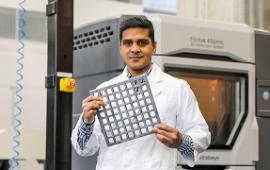Dr Nishar Hameed wins 2018 Young Tall Poppy award

In Summary
- Swinburne’s Dr Nishar Hameed has received the 2018 Young Tall Poppy award for research focusing on advanced composite materials
- He is developing techniques and methods allowing rapid manufacturing of higher quality carbon fibre composites at a lower cost
- He is also working to develop new, scalable and ultra-fast curing resins that can be processed in a few seconds
Swinburne’s Dr Nishar Hameed has received a Young Tall Poppy award for his research focusing on advanced composite materials – incorporating carbon fibres – and their potential in developing stronger, lighter and smarter automotive and aerospace structures.
Dr Hameed – from Swinburne’s Manufacturing Futures Research Institute – is developing techniques and methods that allow the rapid manufacturing of higher quality carbon fibre composites at a lower cost.
Carbon fibre composites are stronger than steel and lighter than aluminium, and thus have the potential to significantly reduce vehicle weight, which would substantially reduce fuel consumption. These high-end composites are not currently cost-effective, or produced at a high enough rate for use in passenger vehicles.
Dr Hameed is also working to develop new, scalable and ultra-fast curing resins that can be processed in a few seconds.
Combining these two technologies together with graphene sensing functionalities has the potential to enable the creation of smart vehicles.
“Winning the prestigious Tall Poppy award is a great motivation for my research and leadership at Swinburne and endorses the value of my team undertaking research with high impact," Dr Hameed says.
“My vision is to build my research in ‘Smart Materials’ - that can self-power, self-sense and be able to communicate. We make them from nano to macro scale using polymers, fibres, composites and nanomaterials such as graphene and demonstrate the applications by making product prototypes.
“I joined Swinburne about two years ago with a passion to do innovative materials research that will have a positive impact on our industries, communities and our environment. I have been fortunate to build a research team, now with over 15 passionate and high calibre members including PhD students and post docs and we collaborate extensively within Swinburne and outside.”
Dr Hameed’s research on rapid manufacturing of smart and lightweight composites may revolutionise the way we make these materials, and lead next generation composite technologies. Earlier this year he won the Phillip Law Postdoctoral Award for excellence in scientific research by an early career researcher in the physical sciences.
Dr Hameed received his PhD from Deakin University in 2011, and is currently an ARC DECRA Fellow at Swinburne.
Young Tall Poppy Science Awards
The Young Tall Poppy Science Awards are run by the Australian Institute of Policy and Science (AIPS) to honour up-and-coming scientists who combine world-class research with a passionate commitment to communicating science. The awards are held on a state by state basis to celebrate researchers across science, engineering and mathematics.
The Victorian awards will be presented today at Swinburne’s Hawthorn campus.
Young Tall Poppies are nominated by their peers and are early career researchers who have under ten years’ post-doctoral experience. Selection is based on research achievement and leadership potential. More than 600 young scientists have been honoured nationally since the awards were established in 2000.

